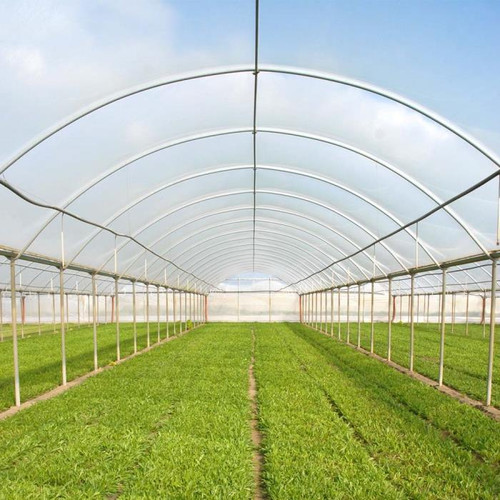Light diffusing greenhouse plastic can prolong your grow season and produce higher yields. This specialized greenhouse plastic is different from light deprivation. Rather than blocking, it evens out the lighting and energy plants receive from the sun. Diffusion reduces shadows and allows the plants to receive a more even distribution of light during the day.
Although the intensity of light at any one point in time may be lower under a diffused film, the total light transmission is excellent and the plants may actually utilize more PAR light through the course of a day, with less stress. This is due to the more even distribution of light at crop level. By eliminating shadows and spreading available energy more evenly on the leaf surface, there is less stress on the top canopy of the plant and more photosynthesis occurring in the lower canopy.
WIth light diffusing greenhouse plastic, you can expect higher crop yields. Growers reportedly experience a 30-40% increase in total crop yields. For some crops, an increase in first quality crop yield of 85% was realized!
Benefits:
- Light diffusing film lowers greenhouse temperature by as much as 9°F when compared to standard greenhouse film.
- Produces higher-yielding plants with stronger than normal root systems.
- Plastic greenhouse covering film provides less demand for watering.
- Inhibits fungus spore development for healthier plants.
- Inhibits insect propagation.
- This Greenhouse covering film provides comfortable working conditions during harvest season.
- This light diffusion film can prolong the growing season.
- Allows for an earlier harvest-up to three weeks earlier harvests have been recorded.
- Guarantees harvesting days LUMINANCE® greenhouse poly film provides a cover from the weather to ensure rain won't delay harvesting.
- With this light-diffusing greenhouse cover, diffused light reaches plants from many different angles, helping prevent the plants from getting scorched.
- Luminance light-diffusing greenhouse plastic are beneficial for raspberries and blackberries.
Diffusion reduces shadows and allows the plants to receive a more even distribution of light during the day. Although the intensity of light at any one point in time may be lower under a diffused film, the total light transmission is excellent and the plants may actually utilize more PAR light through the course of a day, with less stress. This is due to the more even distribution of light at crop level. By eliminating shadows and spreading available energy more evenly on the leaf surface, there is less stress on the top canopy of the plant and more photosynthesis occurring in the lower canopy.
The appearance of diffused greenhouse film is considerably different than standard polyethylene film. This is due to the diffusion (scattering) of light through the greenhouse plastic film. Plants utilize diffuse and parallel light, while our eyes “see” mostly parallel light. This causes a diffused greenhouse film to look dark and hazy compared to a “clear” film, even though the total light transmission remains the same.

Get the Most out of Your Light Diffusing Film
- Reduce or eliminate overspray with pesticides containing chlorine, bromine, fluorine, or sulfur.
- Do not use foggers or smoke generators with any chemical containing chlorine, bromine, fluorine or sulfur.
- Avoid direct contact with PVC products in general, and especially PVC pipe or plasticized PVC tape.
- Avoid direct contact with oil-based paints or products containing petroleum distillate, e.g. wood preservatives.
- Do not substitute white paint for shade compounds designed for greenhouse film. Latex house paint may contain fungicides containing sulfur, halogens, etc. If repeated or prolonged contact with any of the above is unavoidable due to required cultural practices, reduced film life may be inevitable. The greater the contact, the more affect it will have on the greenhouse plastic film.
LUMINANCE® has been specially engineered to give you the results you need from a highly diffused greenhouse film.
Ideal For
- Tomatoes
- Herbs
- Flowers
- Nursery Stock
- Strawberries
- Potted Plants
- Blackberries
- Chilis
- Redcurrants
- Eggplants (Aubergines)
- Blackcurrants
- Raspberries
- Peppers
- High Value Salad Crops
- Cherries
- High Value Vegetable Crops
- Plums
- Zucchini (Courgette)
- Melons










